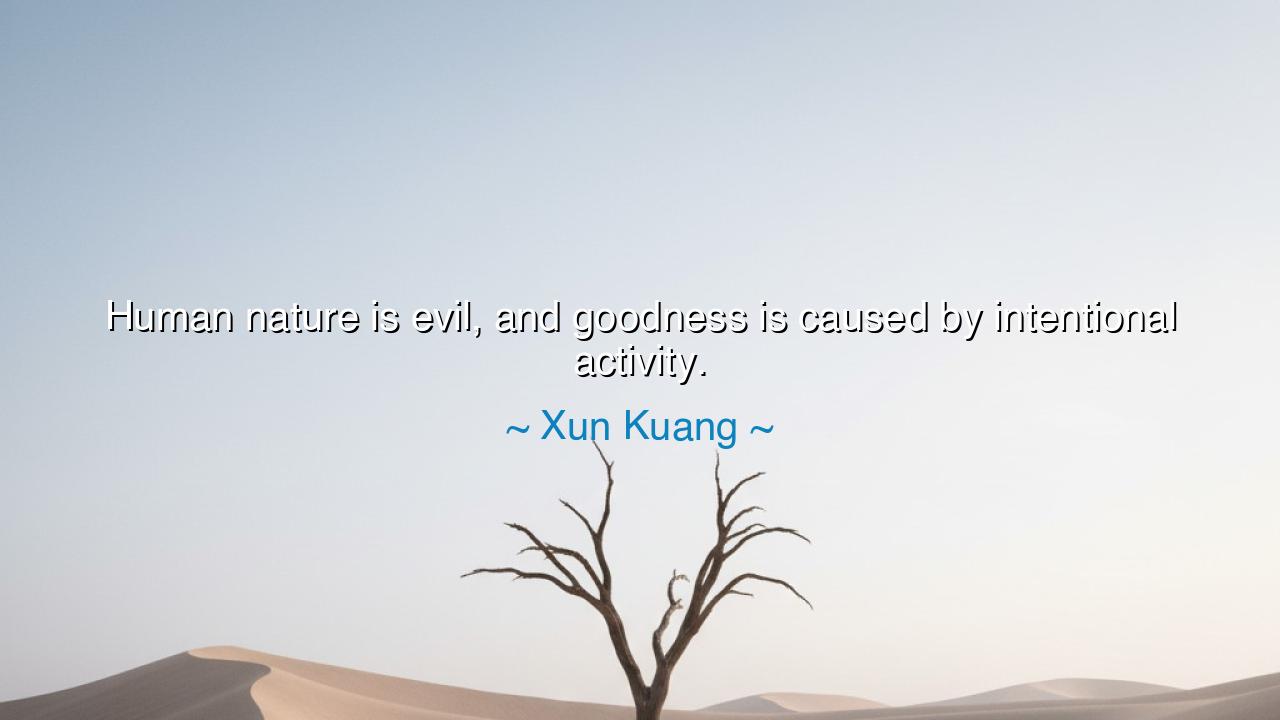
Human nature is evil, and goodness is caused by intentional






Hear now the fierce and unflinching words of Xun Kuang, the sage of ancient China, who declared: “Human nature is evil, and goodness is caused by intentional activity.” In this saying, he cast aside illusions of innocence, speaking not of man as angel, but of man as clay raw and rough, filled with passions, desires, and selfish impulses. To Xun Kuang, men are not born pure, but wild; not born good, but chaotic; and only through discipline, ritual, and deliberate effort can they be shaped into harmony and virtue.
The origin of this saying lies in the Warring States period, when China was torn apart by strife and bloodshed. Rival kingdoms battled endlessly, and chaos reigned among the people. Many philosophers sought to explain this disorder. Mencius, another sage, taught that human nature is good, like water flowing downward. But Xun Kuang, looking at the wars, betrayals, and greed of his age, rejected this. He saw in man a hunger for profit, a tendency toward envy, a heart quick to hate. Left untamed, this nature breeds ruin. Thus, he declared that goodness must be cultivated, like a field weeded and sown, for it does not grow by itself.
Consider the story of Sparta, that city of warriors. There, children were not trusted to grow good by nature. From birth, they were placed in the hands of stern masters, trained with pain, hunger, and discipline. Their impulses toward laziness or selfishness were cut away, and in their place rose courage, loyalty, and strength. Harsh though it was, their society embodied Xun Kuang’s principle: that virtue is not natural but forged through intention, through effort, through shaping. Without this, they believed, man would fall to weakness and chaos.
Yet Xun Kuang’s teaching is not despair, but challenge. For if human nature begins in evil, then man is not condemned to it; rather, he is summoned to rise above it. To cultivate ritual, law, and learning is to refine the rough ore into shining metal. Goodness is not given as a gift, but earned as a victory. It demands intentional activity — the daily choosing of discipline over indulgence, patience over wrath, fairness over greed. Each act of restraint, each act of virtue, is a strike of the hammer shaping the soul.
The meaning of his words, then, is both humbling and empowering. It is humbling, because it denies the comfort of believing we are naturally good, and forces us to confront the shadows within. It is empowering, because it teaches that goodness is a craft, a practice, a mastery that all can achieve through effort. Just as a crooked piece of wood can be steamed and bent straight, so too can the crooked nature of man be straightened by discipline.
The lesson for us is this: do not trust your impulses blindly, for they are not always pure. Recognize that envy, greed, and anger lie within all hearts. But do not despair, for you are not a prisoner of these impulses. You can choose. You can practice. You can act with intention, shaping your life toward goodness day by day. Virtue is not born, it is built. Character is not given, it is crafted.
Therefore, take these practical actions: establish disciplines in your life that guide your impulses, whether through study, ritual, prayer, or meditation. Surround yourself with laws and customs that elevate, not degrade. When temptation comes, pause and act deliberately, remembering that goodness is intentional activity. Teach your children discipline, not indulgence; courage, not comfort; service, not selfishness. For through these practices, the raw clay of human nature becomes the vessel of virtue.
So remember the words of Xun Kuang: “Human nature is evil, and goodness is caused by intentional activity.” Do not be deceived by the ease of impulse or the lie of effortless virtue. Instead, rise each day with discipline, with purpose, with the will to shape yourself anew. For though man is born wild, he may become noble. Though he is born selfish, he may become just. And in this lies the true greatness of humanity — not in what we are, but in what, through effort and intention, we may yet become.






AAdministratorAdministrator
Welcome, honored guests. Please leave a comment, we will respond soon